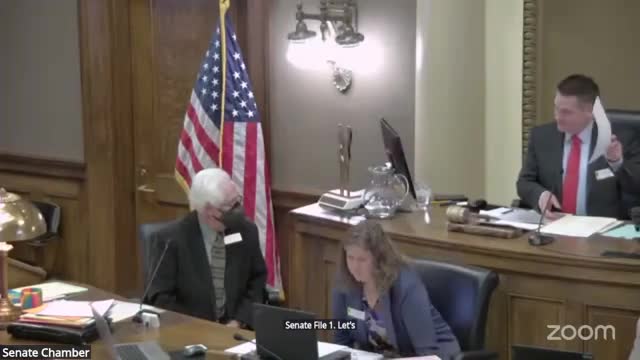Senate amends general government appropriations bill; adopts some amendments, rejects others
Get AI-powered insights, summaries, and transcripts
Subscribe
Summary
On Feb. 7 the Wyoming Senate debated multiple third‑reading amendments to the general government appropriations bill (Senate File 1). The chamber adopted several budget footnotes and line‑item changes and rejected several others, including a proposed $18 million maternity‑care grant program.
Senate File 1, the general government appropriations supplemental for the 2024‑26 biennium, dominated floor debate on Feb. 7, 2025. Senators considered and voted on multiple third‑reading amendments that added, removed or modified funding and reporting requirements across state agencies. The Senate adopted some amendments and rejected others; several adopted items change funding sources or add reporting requirements, while rejected amendments included proposals for historic‑preservation footnotes and a one‑time maternity grants program.
Amendment highlights (third‑reading amendments considered on Feb. 7):
- Third‑reading amendment No. 1 (moved by Senator Gabbreau) shifted a recurring $400,000 appropriation for a helicopter from the tourism account to the state general fund. Floor sponsors said the helicopter appropriation is needed but should come from the general fund because the tourism account is a newer, more limited reserve. The amendment was adopted (vote recorded in the transcript as 26 ayes, 5 no).
- Third‑reading amendment No. 2 (moved by Senator Higgs) added a non‑budget footnote directing a report on state employees teleworking or working from alternate locations, including counts of full‑ and part‑time teleworkers and the number working out‑of‑state. The sponsor characterized the request as an informational one‑time report to produce a snapshot across agencies; the amendment was adopted by voice/division and recorded as adopted in the transcript.
- Third‑reading amendment No. 3 (moved by Senator Larson) reduced cost‑allocation charges for multiple agricultural commissions and special‑revenue accounts to levels in the 2023 biennium. Senators said some producer‑funded commissions had experienced sharp cost‑allocation increases; the amendment passed on roll call (24 ayes, 7 no).
- Third‑reading amendment No. 4 (moved by Senator Steinmetz) would have required impact analysis and protections for historic fairground and similar properties and added a broad requirement that any lease of public property established on or before Jan. 1, 1950 comply with the footnote before disposal. Several senators argued the change was legislation in a budget footnote and raised preemption and scope concerns. The amendment failed (8 ayes, 23 no).
- Third‑reading amendment No. 5 (moved by Senator Pappas) would have added roughly $2.5 million from the tourism reserve to maintain the High Plains Research Center and Arboretum in Cheyenne while the Legislature considered designation of the site as a state park. The sponsor described the center’s historical plant‑research functions, city and volunteer contributions, and an estimated long‑term rehabilitation cost of about $20 million. The amendment failed on the floor (15 ayes, 16 no).
- Third‑reading amendment No. 6 (moved by Senator Jones) added one position for the State Engineer to assist with anticipated workload related to river basin operations and potential curtailment planning. Sponsors described the risk of curtailment and the need for more in‑state hydrographic data and staff capacity. The amendment passed (18 ayes, 13 no).
- Third‑reading amendment No. 7 (moved by Senator Ralphis) proposed an $18 million general‑fund appropriation to the Department of Health to provide grants to public hospitals, rural health care districts and special hospital districts to support delivery and maternity care. Supporters called it a stop‑gap to keep local maternity services operating; opponents said the proposal lacked programmatic details, rule‑making authority, eligibility criteria and a durable funding plan and argued the topic deserved more interim study. The amendment failed (11 ayes, 20 no).
Floor debate included questions about funding sources, long‑term liabilities (the High Plains Research Center was discussed as requiring roughly $20 million in eventual repairs according to a sponsor’s floor statement), and whether one‑time appropriations would create unsustainable expectations. Supporters of amendments to preserve services argued that starting programs anew is costlier than maintaining existing services. Opponents repeatedly urged committee or interim study for program design before funding.
The transcript records each amendment vote as described above and shows the Senate adopting a mix of reporting requirements and funding‑source changes while rejecting other line‑items and one‑time grants. After amendment action the Senate recessed for the day and committee scheduling followed.
This package of amendments will be incorporated into the Senate File 1 conference/engrossment process; stakeholders and local units that participated in the floor debates—hospitals, agricultural commissions, the City of Cheyenne (High Plains Research Center), and state agencies—should follow the bill as it proceeds.
